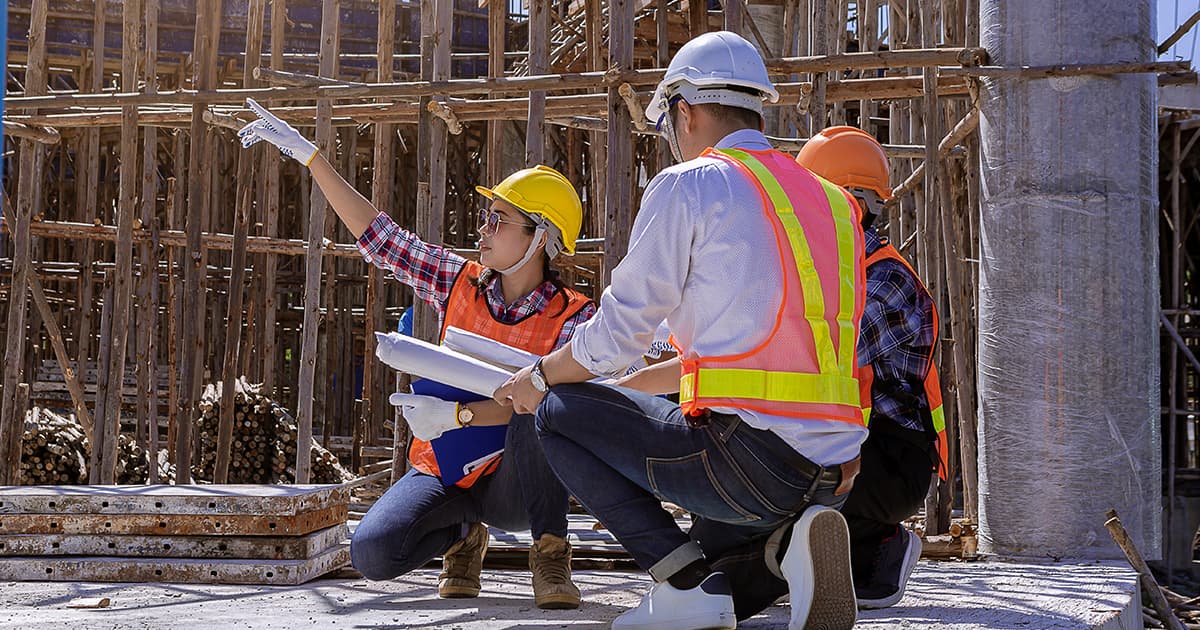Why Alberta Contractors Need Course of Construction Insurance

Course of construction insurance protects you as an Alberta contractor when you’re building a commercial, residential, or industrial project from beginning to end. It insures buildings under construction against the costs of repair or replacements in the event of an accident, fire, or mishap.
It’s also called builders risk insurance. This type of insurance for Alberta contractors should be considered as essential to your construction business.
Wherever you work as a general contractor in Alberta, your Western Financial Group business insurance expert will give you top-notch commercial insurance advice and ways to save on insurance for your contracting business.
What is course of construction insurance?
Course of construction insurance, or builders risk insurance, covers a building, job site, and construction materials during the construction phase, including renovation and repair.
Why do I need course of construction insurance?
As an Alberta general contractor, commercial property owner, or property developer, you need to have course of construction insurance to protect what you’re building from start to finish, whether it’s a residential, commercial, or industrial project.
Your typical contractor’s insurance policy would not cover buildings under construction, which is why you need course of construction insurance coverage.
How course of construction insurance can help you as an Alberta builder
A course of construction insurance policy typically covers risks, including:
- Burglary, theft, vandalism, and damage caused by malicious acts
- Fires, explosions, and lightning strikes
- Windstorms, hail, excessive rain, floods
- Damages caused by the impact of a vehicle or an aircraft
- Collapse of a structure under construction
What doesn’t course of construction insurance cover?
It doesn’t cover poor workmanship, mistakes, or negligence.
What kinds of projects can course of construction insurance cover?
- Small residential builds
- Commercial construction projects
- Large high rises
- Multi-family units
- Single-family dwellings
- Residential and commercial
- Rebuilds
- Municipal projects
How much does course of construction insurance cost for Alberta contractors?
The cost for course of construction insurance will depend on factors such as:
- The type of construction
- The value of the project/materials
- How long the project is expected to last
- Any past claims
- Security measures
How course of construction insurance/builders risk insurance can protect you as an Alberta contractor
- Vandals deface the building you are constructing with graffiti. Course of construction insurance would help cover the costs of removing the graffiti.
- A fire starts in the storage building where your construction materials are stored and the building and materials are destroyed. Course of construction insurance helps cover the cost to replace the materials and restore the storage building.
- A windstorm tears some of the roofs of multi-family dwellings you are building. Course of construction insurance would help cover the costs of repairing the damage.
As an Alberta contractor, make sure you have the right contractor insurance package to protect your business
Here’s what you need:
Commercial general liability (CGL) insurance
CGL insurance is essential protection in construction business. It protects you against claims that allege third-party, such as a client getting injured on your job site or their property getting damaged.
It can also help protect you against third-party property damage such damaging property while you are pipefitting work at a jobsite, home, or business.
Without commercial general liability insurance, you would be responsible for paying any liability costs out of your own pocket.
You can expect to have a minimum of $2 million in CGL insurance and likely more.
Professional liability insurance
This type of insurance is also known as errors and omission (E&0) insurance.
If you are faced with a lawsuit as an Alberta contractor, professional liability insurance can help protect you against loss in the event of a lawsuit due to a negligent act, or an error or omission in the course of your services.
Tools and equipment insurance
It replaces, or repairs damaged, stolen, or lost equipment and tools, accessories, or other property that you use in your work as an Alberta contractor.
Anything valued at less than $1,500 is considered a tool and anything above that limit is considered equipment.
This type of insurance can also be called equipment floater insurance instead of equipment and tools insurance.
Commercial Auto Insurance
You need commercial auto coverage as part of your insurance package. Your personal car policy will not cover you should you get into an accident while travelling to work.
Mobile property insurance
If you regularly move equipment across different locations in Alberta, mobile property insurance provides coverage for property that you don't store at a fixed location, or for equipment routinely taken offsite.
Mobile property insurance covers transit and theft that could happen due to property not being stored in a secure location, as opposed to commercial property insurance that covers property generally expected to be in a designated location.
What do I do if there’s a claim against me as an Alberta general contractor?
- Contact your broker immediately after any business-related mishap. Waiting to file a claim can confuse insurers about the severity of the damages to your business.
- Know your policy so that when you contact your broker you are familiar with what will be covered or not.
- Document the damage. Take photos right away and write down what happened.
- Do not throw away damaged goods after taking photos. Keep the physical evidence so that your adjustor can see it.
- Do not invite lawsuits. Don’t say anything that could be used against you, especially if you aren’t sure what happened.
- Be honest about what your damaged property is worth. Damaged commercial property is generally valued according to its actual cash value or replacement value.



